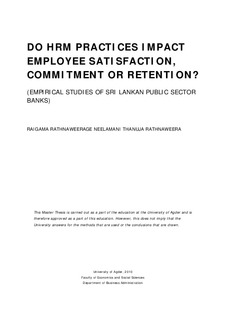| dc.contributor.author | Rathnaweera, Raigama Rathnaweerage Neelamani Thanuja | |
| dc.date.accessioned | 2010-10-07T11:51:05Z | |
| dc.date.available | 2010-10-07T11:51:05Z | |
| dc.date.issued | 2010 | |
| dc.identifier.uri | http://hdl.handle.net/11250/135556 | |
| dc.description | Masteroppgave i økonomi og administrasjon - Universitetet i Agder 2010 | en_US |
| dc.description.abstract | This study attempted to examine the impact of Human Resource Management practices on
Human Resource Management outcomes in Sri Lankan public sector banks. Research on Human
Resource Management practices and their outcomes such as employee satisfaction, commitment,
and retention have rarely been conducted in banking industry in Sri Lanka. Data were collected
on employees’ perceptions about Human Resource Management practices and their outcomes
through structured questionnaire. Sample consisted of 209 employees who are working in
different departments of branches in two PSB in Sri Lanka. Multiple Regression, Cronbach
alpha, Pearson correlation coefficient and descriptive statistics were used for various analyzes of
this study. The findings of the research revealed that Human Resource Management practices
are significant predictors of employee satisfaction, commitment and retention.
The results of this study revealed that bundles of HRM practices are positively related to better
employee satisfaction with adjusted R2 of 0.623 and a F-value 58.242 (p<0.001) .Compensation
and social benefits had the strongest effect on employee satisfaction with a standardized beta of
0.655. This study found that bundles of HRM practices are also positively related to better
employee commitment and compensation & social benefits (t = 5.546; p = 0.000), recruitment &
selection (t = 4.158; p = 0.000), and training & development practices (t = 3.100; p = 0.002)
emerged as the significant variables in explaining the variance in employee commitment.
Compensation & social benefits, performance appraisal, and training & development were found
to be explanatory factors having significant effect on employee retention of Sri Lankan public
sector banks. Compensation and social benefits had the strongest significant effect on employee
retention (t = 3.269; p = 0.001) with a standardized beta of 0.231. It is of interest to note that
compensation and social benefits practice had the strongest effect on determining the employee
satisfaction, commitment and retention of PSB in Sri Lanka. Findings of this study show that
providing training for employees is positively related to higher employee satisfaction, employee
commitment and higher employee retention. Results of regression analysis supported the
hypotheses that performance evaluation is positively related to higher employee satisfaction,
commitment and retention of public sector banks in Sri Lanka. Findings of this study do not
support the hypotheses that grievances handling system of PSB in Sri Lanka is positively related
to higher employee satisfaction, commitment and retention | en_US |
| dc.language.iso | eng | en_US |
| dc.publisher | Universitetet i Agder ; University of Agder | en_US |
| dc.subject.classification | BE 501 | |
| dc.title | Do HRM practices impact employee satisfaction, commitmentor retention? : (empirical studies of Sri Lankan public sector banks) | en_US |
| dc.type | Master thesis | en_US |
| dc.subject.nsi | VDP::Social science: 200::Economics: 210::Economics: 212 | en_US |
| dc.source.pagenumber | 177 s. | en_US |
